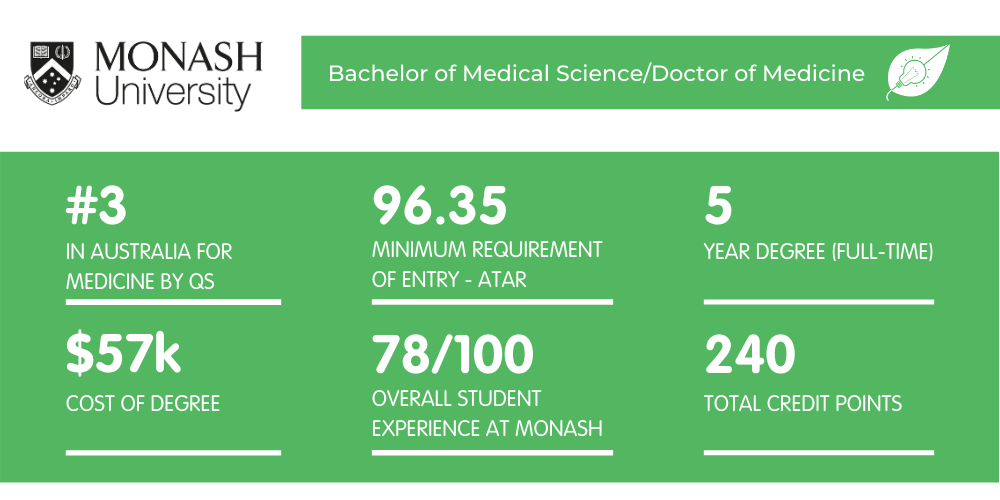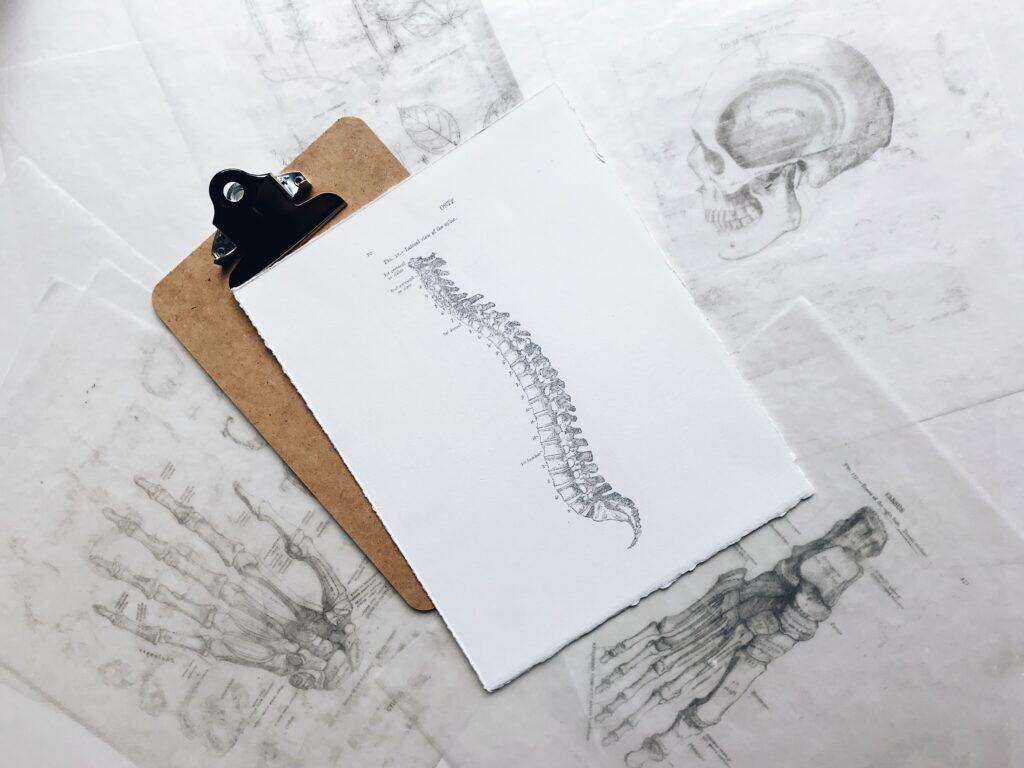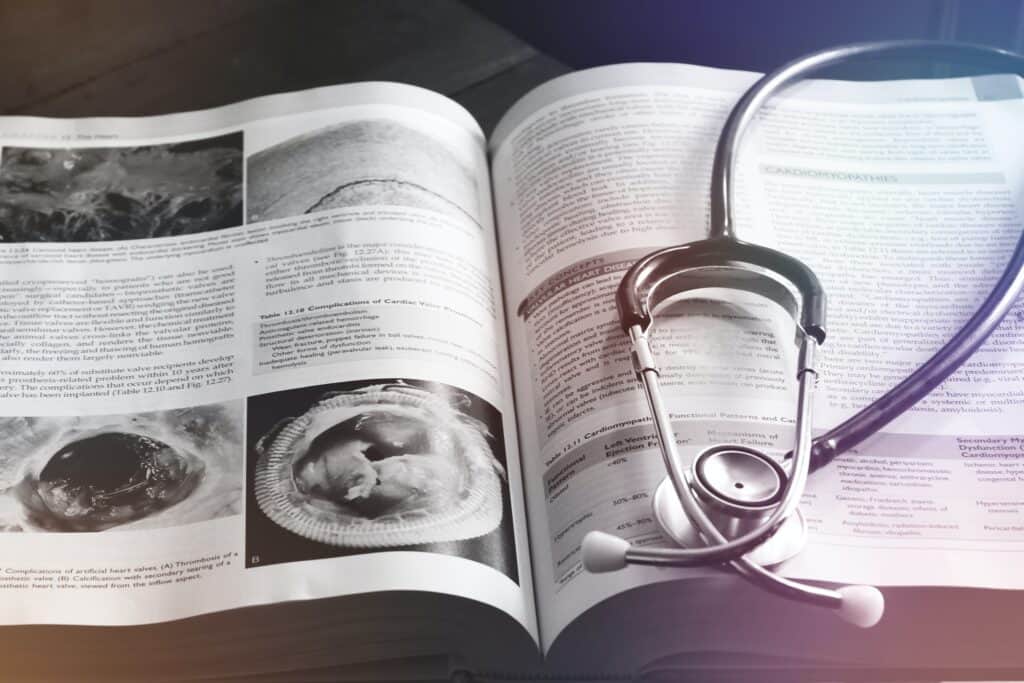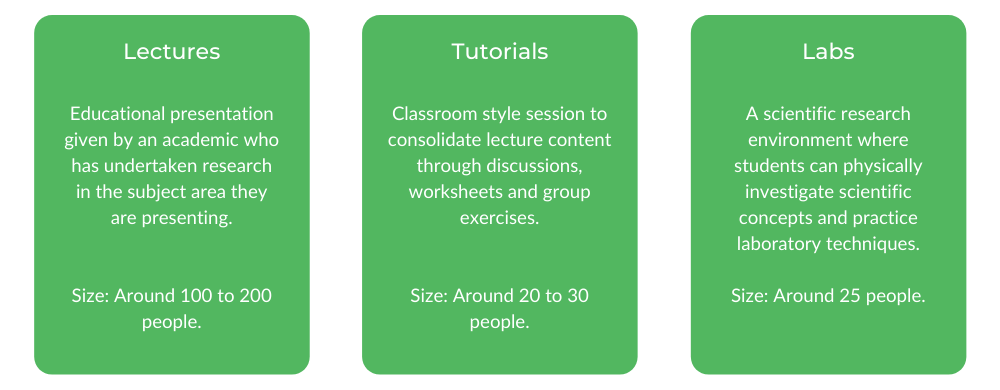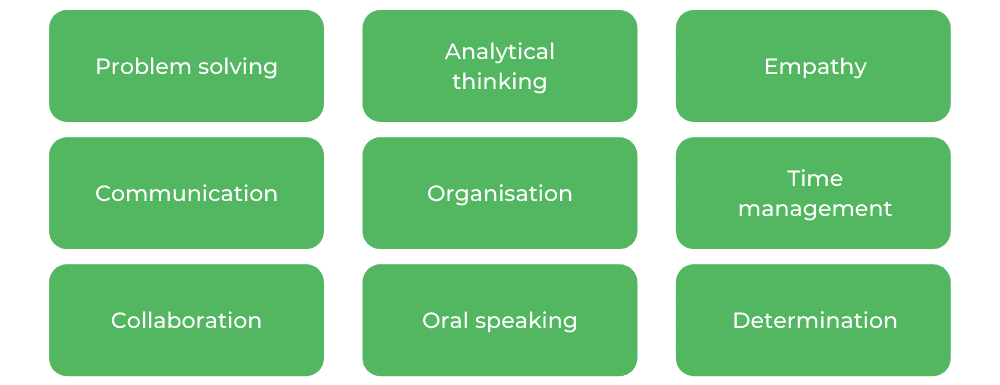Wanting to study Medicine? Perhaps your dream of becoming a doctor is getting closer, and you’re now looking into a Monash Medicine degree!
Below, we’ve compiled everything there is to know about the culture, units, assessments, cohort and what it’s really like studying Medicine at Monash.
Let’s get right into it!
What is a Bachelor of Medical Science and Doctor of Medicine at Monash?
Core Units for this Degree
How to Get into Medicine at Monash
What’s the Teaching Format?
What’s the Faculty and Culture Like?
What is a Bachelor of Medical Science and Doctor of Medicine at Monash?
Good question because that name is a mouthful!
To break it down, the Bachelor of Medical Science and Doctor of Medicine is pretty much Monash’s main medical degree that is designed to prepare students for a direct pathway to working as a medical professional.
Medicine at Monash is a 5-year degree and is one of the few medical programs offered to students straight after Year 12. Hence its title, it’s a course that combines a Bachelor degree with a Doctors.
So, you won’t be searching for postgrad medicine or honours courses once you graduate — unless you’re looking to specialise. It’s a perfect option for students who excel academically and want a straightforward path to medicine.
As a Medical student at Monash, you’ll be undertaking your studies with a focus on health and illness, population, society, the scientific basis of clinical practice and clinical skills which you’ll develop through assessments, clinical placements and professional practice.
It’s a lot to get your head around, but we’ll cover it all later on!
Career Paths
As a graduate from Medicine at Monash, it’s likely that you’ll want to pursue a career as a medical professional. This would be great as the degree is designed to support all students to become valued and important doctors.
However, it’s good to know that there are loads of different fields you could work in. Especially since you’ll be graduating with a Bachelor of Medical Science on top of a Doctor of Medicine, your skillset will be pretty broad and will be applicable to a wide scope of professions.
Some of these may include:
- General Practitioner
- Paediatrician
- Radiologist
- Cardiologist
- Neurologist
- Research scientist
- Immunologist
- Pathologist
- Pharmacologist
- Biomedical scientist
- Ophthalmologist
- Hospital doctor
There are a lot of options! Don’t feel as though a degree in Medicine can only be used to become a GP because that’s not the case. Some of these professions may need some extra study if you’re wanting to specialise but even so, your degree will provide some essential foundations.
Want to know more about working as a Doctor? Check out our article here!
Core Units for this Degree
To graduate from the Monash Medicine undergraduate and Doctor of Medicine, you’ll need to complete a total of 240 credit points. Credit points are how universities will measure the workload of particular subjects.
By knowing how many credit points a unit is worth, you’ll be able to compare subjects and see how much time you’ll need to commit to it. All of your subjects for the first few years are worth 24 credit points each.
This means that to be on track to graduate in 5 years, you’ll only be taking around 2 subjects per year and while this may look good, in reality it’s going to be a lot of work.
A medicine degree at Monash is almost entirely prescriptive. So, while you only have a couple subjects to complete, they’ll cover some very broad material.
Your studies will be mainly broken up into 4 distinct categories. These will include:
- Personal and professional development
- Population, society, health and illness
- Scientific basis of clinical practice
- Clinical skills
Your first two years in the Monash Medicine undergraduate course will pretty much cover the undergraduate part of your degree. So, you’ll be gaining a foundational understanding of medical science as a discipline.
In your next three years, you’ll be focusing on putting those skills into practice by applying them to a range of medical situations. We’ll discuss your first and second years first:
First and Second Year
The Monash Medicine undergraduate classes that you’ll take over these 2 years include:
| Core Units | Description |
|---|---|
| Introduction to Medical Practice | This is a foundational unit that will introduce you to the 4 categories that we mentioned above. You’ll be getting to know the themes like professional and professional development; society, population, health and illness; scientific basis of clinical practice and clinical skills. |
| Principles of Medicine 1 | In this subject, you’ll be developing the knowledge and skills that are required for a career in medicine. Again, you’ll be building on the foundations of the themes listed above. |
| Foundations of Medical Practice | This is all going to sound a bit repetitive but pretty much, you’ll be learning more about the foundations of medicine! You’ll be taught about the appropriate skills, attitude and knowledge that will suit patient-centred health care. |
| Principles of Medicine 2 | To finish off your second year, you’ll be consolidating and developing the material that you’ve covered so far throughout your studies. |
All of these foundational subjects will be taught through a combination of medicine and patient-based presentations. While the titles and descriptions seem very broad, you’ll be covering topics like:
- Nutrition
- Human behaviour
- Cardiovascular system
- Genomics
- Immunology and infection
- Metabolism
- Molecules, cells and tissues
- Musculo-skeletal system
- Neurosciences
- Urinary system
- Reproduction
- Respiratory system
Third and Fourth Year
In this period, you’ll be receiving your content through a mix of clinical rotations, small group discussions, applied medical science and patient-oriented presentations. You’ll be gaining essential real world experience by applying your knowledge to a variety of clinical settings from metropolitan to rural hospitals.
In your third year, you’ll focus on:
- Medicine
- Surgery
- Pathophysiology
In your fourth year, you’ll focus on:
- Children’s health
- General practice
- Psychological medicine
- Women’s health
Fifth Year
In your fifth and final year, you’ll be undergoing a transition from student to trainee intern. You’ll be enhancing your clinical skills, research abilities and diagnostic knowledge in clinically oriented placements.
These clinical positions will include:
- Aged care
- Emergency medicine
- Surgery
- Speciality
- Scholarly intensive project
- Medicine
The content for your Doctor of Medicine will be covered in your fourth and fifth years through six different subjects which will all involve a large and pretty long-term clinical placement.
Placements and Internships
So, yes. As we mentioned, there will be a load of placements and practical studies that you’ll undergo in a range of different clinical settings. These will be spread out across your degree but will be the main focus of your fourth and fifth year.
This is also when you must possess a valid Working with Children Check, Police Check and have an appropriate immunisation status.
You can take a look at Monash’s Student Placement Guide for Medicine and Nursing students right here!
How to Get into Medicine at Monash
To be eligible for a spot in the Bachelor of Medical Science and Doctor of Medicine at Monash, you’ll need to achieve an ATAR of at least 92.65, although a higher score will definitely increase your chances.
Lowest Monash Medicine ATAR for entry: 92.65
Apart from your ATAR, the two additional criteria for Monash Medicine entry requirements include:
- UCAT score of 2900
- Multiple Mini Interviews: Eight 10-minute interviews each testing one of 8 skills (advocacy, collaboration, critical thinking, empathy, ethical reasoning and motivation)
University Clinical Aptitude Test (UCAT)
As well as the requirements mentioned above, to be shortlisted for the course, you’ll also need to successfully complete the University Clinical Aptitude Test (UCAT).
This is a 2 hour-long computer-based test which assesses a broad range of skills and abilities to determine whether you’d be suited for a strenuous position in the medical force. You’ll be assessed on skills like problem solving, comprehension, analytical thinking and abstract reasoning.
There are plenty of UCAT practice tests online if you want to have a scroll!
You can find out more about the UCAT right here!
Monash Medicine Acceptance Rate
There are a total of 237 places will be offered for the Monash Medicine direct entry.
There is a 35% acceptance rate for the applicants who complete the UCAT test, meet subject pre-requisities, meet the raw minimum ATAR, and attend the interview — it’s safe to say that it’s a pretty tough process!
Bonded Medical Program at Monash Medicine
To increase your chances of getting into Monash Medicine, consider ticking the box for a Bonded Medical Place!
Like your average Commonwealth Supported Place, you’ll get funded by the government to study Medicine at Monash. The extra obligation is that once you graduate, you must work 3 years at a certain location where there is a shortage of medical services.
The 3 years is highly flexible — you don’t have to work the 3 years all at once, so long as you get it done over an 18 year period.But, don’t take this agreement lightly — understand that you’ll have to truly commit your time working in areas of need, such as rural towns.
Pathways at Monash Medicine
Medicine at Monash is a pretty tough course to get into so there aren’t too many alternative entry pathways.
However, you are able to use Monash’s study credit and admissions eligibility search if you want to see if you’re able to transfer into the course from a different degree. This way, you can submit the prior study you’ve completed and see whether you’re eligible to transfer.
Since it is such a prestigious course, your chance of getting in will pretty heavily depend on a high 90s ATAR. So, it’s pretty tricky to do. Alternatively, if you’re looking a degree that’s slightly easier to get into, you may be interested in:
- Bachelor of Biomedical Science
- Bachelor of Health Sciences
- Bachelor of Medical Science (Honours)
- Bachelor of Nursing
- Bachelor of Paramedicine
So, you’ve got a lot of other options in the health and medical field if you’re worried about the chances of getting into Medicine at Monash.
Other Entry Requirements for Monash Medicine
Alongside academic excellence and a high ATAR, to secure your spot in Medicine at Monash, there are a few other requirements to sort out. You’ll need to complete:
- An interview
- Police Check
- Working with Children Check
- Immunisation and infection requirements
- First Aid Course
Assumed Knowledge
To be eligible to study Medicine at Monash, you’ll need to have completed English and Science in Year 12. It’s not compulsory that you’ve taken Maths but it’s definitely a subject that will be helpful if you’re confident in it.
For VCE subjects, you’ll need to score at least 35 in English and at least 30 in science (or the equivalents for other states).
Scholarships
Monash offers a wide scope of scholarships for potential Medicine students! These are awarded on account of a variety of different reasons.
Although, as with all aspects of Medicine, competition will be pretty high.
You can take a look at the scholarships offered by Monash’s School of Medicine right here!
What’s the Teaching Format?
You’ll be undergoing your studies at Monash through the semester system. This means that you’ll be studying during two sessions with some pretty generous breaks in between.
If you’re someone that values decent holidays for extra work, internships, summer classes or just to refresh and rejuvenate, then the semester program may be great for you.
Class Structure
As a student in Medicine at Monash, you’ll be required to attend at least a lecture and tutorial for each of the subjects that you’re taking. Since your classes will be entirely structured, you’ll be taking the same classes as the rest of your cohort which gives you a great chance to foster some long-term friendships and networks.
For more practical classes, on top of a lecture and tutorial, you’ll be required to attend lab sessions where you’ll apply your knowledge to real world situations.
“For classes like Anatomy, there is quite a bit of practical learning. We’ll go to labs, in the second semester of first year and second year as well, to actually see a lot of the structures on the cadavers or 3D printed human body parts.
We also have clinical skills which are more focused on the doctor element. It’s about interacting with patients, so sometimes they’ll bring in patients and oftentimes we’ll just practice on each other.” — Vivian Xiao, Bachelor of Medical Science/Doctor of Medicine III at Monash University
So in your first three years in the Bachelor of Medical Science and Doctor of Medicine course, you’ll be mainly studying through lectures and tutorials with a few labs for your practical subjects.
To account for your lectures, tutorials, labs and individual study time, you can expect to be on campus for upwards of 20 hours a week.
As a Medical student, you’ll be spending a lot of time studying and hitting the library after class. Your contact hours and course structure will also be changing as you progress through your degree.
Lectures
A lecture as a Medicine student will typically last from 1 to 2 hours and you’ll be in the lecture theatre with around 100 to 200 other students at a time.
Lectures are the sessions that will introduce you to the upcoming weekly content. They’ll involve a lecturer or guest speaker discussing the material that’s being presented in a powerpoint.
These classes are usually a relatively passive experience and you’ll be mainly spending the lecture taking notes and maybe coming up with some questions that you’ll ask in a future tutorial.
Especially as a Medicine student, you’ll be needing to take the initiative to get your head around everything. If this means writing down any piece of material that you’re even slightly confused about to ask your tutor, go ahead!
Tutorials
Like lectures, you’ll be attending a tutorial for each of your classes where you’ll usually be surrounded by around 20 to 30 other students at a time.
A tutorial is a perfect chance to ask any questions, facilitate discussions and chat with your tutor to make sure you’ve got a solid understanding of the content. Since your material will be changing weekly, it’s important that you dedicate enough time to feel confident in the work so that you’re prepared to ace upcoming assessments.
Tutorials are also great places to make those solid friendships because you’ll be with this cohort throughout your whole degree!
Labs
As we mentioned, you won’t have a lab for all of your classes, just the practical classes to give you a chance to work with cadavers and 3D printed parts of the body. These classes will run for about 1 to 2 hours and you’ll be in a class with around 25 other students.
In this case, the term ‘labs’ is the overarching name for the practical classes that you’ll participate in during your course. Sometimes you’ll go to a laboratory to explore the materials and scientific elements of your degree while other times you’ll attend hospital wards to put your knowledge into practice.
These practical classes will become more regular as you progress to the Doctor of Medicine part of your degree.
Assessments
The kinds of assessments that you’ll be graded on will vary throughout your degree. In your first, second and third years, you can expect to be doing a lot of written essays, oral presentations, quizzes and reflections.
In your fourth and fifth year, as a student in the Doctor of Medicine, your assessments will be much more practical-based. You’ll be largely graded on how you perform in clinical situations.
In one of your last assessments, your studies will be based on five clinical placement rotations where you’ll practice working in aged care, medicine, surgery, emergency medicine and a speciality of your choice.
Skills That You Refine and Learn
The skills and knowledge that you solidify during your Medicine degree at Monash are designed to prepare you to begin professional work soon after you graduate. You may have to undergo some more internships and placements to become a practicing GP but either way, once you graduate, you’ll be well on your way!
A professional and respected doctor will have great communication, empathy and oral speaking skills to be able diagnose, discuss sensitive issues with patients and form a rehabilitation plan, prescribe medicine or consider the appropriate next steps.
As a doctor, you’ll be someone that’s valued in your community, no matter which pathway or specialty you decide to pursue. Possessing great time management and organisation skills will also ensure that you and your patients are feeling supported and in control at all times.
Want more info about Monash Medicine? Check out our article here for the pros and cons!
What’s the Faculty and Culture Like?
As a medicine student at Monash, you’ll be positioned within the Faculty of Medicine, Nursing and Health Sciences. This faculty serves 10 different schools, centres and institutes.
Alongside the School of Medicine, the faculty is involved in the Clinical School, the School of Nursing and Midwifery, the School of Psychological Sciences, the School of Rural Health and many more experienced and accomplished institutes.
Monash’s School of Medicine will support you in selecting the clinical sites that you’d like to work with as well as providing many simulated patient programs to ensure you’re prepared and confident to try the real thing!
Monash’s Medicine schools and faculties are full of caring, supportive and passionate researchers, academics and medical professionals who are always willing to give you a helping hand and share some of their valuable experiences.
Clubs and Societies
Monash has a huge range of clubs and societies to appeal to any interest imaginable! There are over 100 student-led clubs and societies, any of which will be the perfect place to foster friendships, enhance your network and just have fun!
You could stick to what you know by joining the Medical Students’ Society, the Medical Union of Students or the Monash Medical Orchestra! Or you could broaden your horizons and embrace your funky side by being a part of the Shakespeare Company, the Boardgames Society or the Creative Writers Club!
Resources
While studying Medicine can be an extremely rewarding and valuable experience, it’s also known to be quite isolating. You’re expected to do an awful lot of study to stay on top of things.
Luckily, Monash understands that combined with work, relationships and home stress, university can be difficult.
Monash offers a range of support services for current, future and past students for academic help, language support, counselling, disability services, course advice or IT support. Whatever it is, Monash is there to help.
Take a look at Monash’s Health and Wellbeing page here and check out Monash’s study support page right here.
Searching for more resources on studying Medicine?
If your heart is set on studying Medicine, but feel like you need more info before deciding where you’ll study it, we’ve got some great resources to help you!
Check out these medical degrees on offer in Australia:
- Bachelor of Science/Doctor of Medicine at USYD
- Bachelor of Medical Science at ANU
- Bachelor of Biomedical Science at UQ
- Bachelor of Medical Studies/Doctor of Medicine at UNSW
- Bachelor of Medical Sciences at Macquarie University
- Bachelor of Medical Science at UTS
- Doctor of Medicine at WSU
If you’re wondering what it takes to get into Medicine, check out our 99+ ATAR Scorer Guide here!
Gemma Billington is a Content Writer at Art of Smart and an undergraduate student at the University of Technology Sydney. While studying Journalism and Social and Political Sciences, Gemma enjoys spending her time at the gym or reading about Britain’s medieval monarchy – ideally not at the same time. She currently creates and administers social media posts for Central News and writes for the student publication, The Comma. After completing her undergraduate degree, she hopes to study a Masters of Medieval History and is very excited about the prospect!

